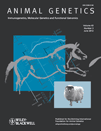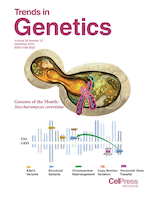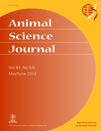
ANIMAL GENETICS
Scope & Guideline
Exploring the Genetic Blueprint of Animal Life
Introduction
Aims and Scopes
- Genomic Analysis and Breeding:
The journal publishes research on genomic selection, genome-wide association studies (GWAS), and the development of genetic markers for improving breeding programs in livestock and companion animals. - Animal Health and Disease Genetics:
Research pertaining to the genetic basis of diseases in animals, including inherited disorders and genetic predispositions to specific health conditions, is a significant focus. - Evolutionary Genetics and Biodiversity:
Studies exploring the evolutionary dynamics, genetic diversity among breeds, and conservation genetics are also prevalent, reflecting the journal's commitment to understanding both domestic and wild animal populations. - Functional Genomics and Molecular Biology:
The journal covers functional genomics, including the role of non-coding RNAs and epigenetic modifications in gene expression and trait development, providing insights into the molecular mechanisms underlying animal genetics. - Comparative Genomics and Genomic Technologies:
Research involving comparative genomics across species and the application of cutting-edge genomic technologies for animal improvement and health is a key area of focus.
Trending and Emerging
- Multi-Omics Approaches:
There is an increasing trend towards integrating various omics data (genomics, transcriptomics, proteomics) to provide a holistic view of animal biology and enhance trait prediction accuracy. - Environmental Adaptation Genetics:
Research focusing on the genetic basis of adaptation to environmental challenges, such as climate change or disease resistance, is on the rise, highlighting the importance of resilience in livestock. - Genetic Technologies for Disease Resistance:
Emerging studies are emphasizing the development and application of genetic technologies to enhance disease resistance, particularly in the context of livestock health and welfare. - Precision Breeding Techniques:
The use of precision breeding techniques, including CRISPR and other gene-editing technologies, is becoming more prominent, reflecting advancements in genetic engineering and biotechnology. - Integration of Machine Learning in Genetics:
The adoption of machine learning algorithms to analyze genomic data and improve genomic predictions is an emerging trend, indicating a shift towards data-driven approaches in animal genetics.
Declining or Waning
- Traditional Breeding Methods:
Research dedicated to traditional breeding practices is becoming less frequent as genomic approaches gain popularity and prove more effective in improving animal traits. - Phenotypic Studies without Genomic Correlation:
Studies focusing solely on phenotypic observations without linking them to genetic data are waning, as the field increasingly prioritizes genetic explanations for observed traits. - Basic Genetic Mapping Studies:
Basic mapping studies that do not leverage modern genomic technologies or large datasets are seeing a decrease, reflecting a shift toward more integrated and comprehensive genetic analyses. - Animal Behavior Genetics:
Although still relevant, research specifically addressing the genetics of animal behavior is less frequent in the recent publications, possibly due to a focus on more economically impactful traits.
Similar Journals

GENOME
Exploring the Depths of Genomic ScienceGENOME is a leading peer-reviewed journal published by Canadian Science Publishing, dedicated to advancing the field of genetics, biotechnology, and molecular biology. With a strong commitment to disseminating high-quality research, GENOME has earned a reputable spot in the academic community, boasting a Q2 classification in Biotechnology and Medicine (miscellaneous), and a Q3 rank in Genetics and Molecular Biology for 2023. The journal, identified by its ISSN 0831-2796 and E-ISSN 1480-3321, publishes innovative studies that span from 1987 to 2024, ensuring a rich historical context while addressing contemporary challenges in the field. Researchers and professionals are encouraged to contribute and engage with content that shapes the landscape of genetic research. Although the journal does not currently provide open access, it remains a vital resource for those committed to the exploration of genomic sciences, making it an essential read for both seasoned researchers and students alike.

TRENDS IN GENETICS
Elevating the Standards of Genetic ScholarshipTRENDS IN GENETICS, published by CELL PRESS, is a leading journal in the field of genetics, recognized for its significant impact on research and advancements in the discipline. With an impressive Scopus ranking of #10 out of 347 in the category of Genetics and a 97th percentile ranking, this journal stands as a premier platform for publishing innovative, high-quality articles that shape the future of genetic research. Since its inception in 1985, TRENDS IN GENETICS has been at the forefront of the genetic sciences, continuously disseminating crucial findings while maintaining a strong commitment to scientific rigor and integrity. Although it does not currently offer open access options, its rigorous peer-review process ensures that only the most relevant and groundbreaking studies make it to publication. Scholars and practitioners in genetics will find this journal to be an invaluable resource for keeping abreast of the latest developments, trends, and methodologies that drive the field forward.

Annual Review of Genomics and Human Genetics
Leading the Charge in Genomic and Genetic ResearchAnnual Review of Genomics and Human Genetics, published by ANNUAL REVIEWS, represents a pivotal platform in the field of Genetics and Molecular Biology. With an impressive impact factor reflecting its high citation rate and scholarly influence, this journal is renowned for its authoritative reviews that synthesize current research across genomics and human genetics. Highlighting its Q1 category rankings in both Genetics and Clinical Genetics, as well as its ranking within the top tiers of Biochemistry and Genetics, the journal stands out as a leading resource for researchers, professionals, and students eager to stay abreast of groundbreaking developments in these rapidly evolving fields. While not currently an open access journal, its rigorous peer-review process ensures the highest standards of scientific integrity. Researchers can access comprehensive reviews that delve into both fundamental genetics concepts and cutting-edge discoveries, making it an essential resource for advancing understanding in human genetics and its applications.

MOLECULAR BREEDING
Fostering Excellence in Molecular Genetics and Crop ScienceMOLECULAR BREEDING is a prestigious journal published by Springer, dedicated to advancing the field of agronomy, plant science, and biotechnology through innovative research contributions. With an impressive ISSN of 1380-3743 and E-ISSN 1572-9788, this journal has continuously served the scientific community since its inception in 1995. Operating from the Netherlands, MOLECULAR BREEDING is recognized for its high impact factor and status in the Q1 quartile for both Agronomy and Crop Science and Plant Science in the latest 2023 metrics, highlighting its influential role in these domains. With strong Scopus rankings reflecting its position within the top percentiles of various related fields—including a notable 81st percentile in Plant Science—this journal is essential for researchers, professionals, and students striving to understand and innovate in molecular genetics and breeding techniques. Although it does not provide open access, its rigorous peer-review process ensures that published articles maintain the highest standards and contribute significantly to the scientific discourse. The journal’s diverse scope encompasses significant advancements in molecular biology and genetics, ultimately supporting the global objectives of sustainable agriculture and enhanced crop resilience.

G3-Genes Genomes Genetics
Empowering Global Collaboration in Genetic DiscoveryG3-Genes Genomes Genetics is a prominent open access journal published by Oxford University Press, Inc., dedicated to advancing the field of genetics and genomics. Since its inception in 2011, the journal has become a vital resource for researchers, professionals, and students, featuring high-quality, peer-reviewed articles that cover a broad spectrum of topics within genetics, including clinical genetics and molecular biology. With an impressive standing reflected in its 2023 Scopus rankings, which positions it in the Q2 category for Genetics (Clinical) and Q1 for Medicine (Miscellaneous), G3 remains at the forefront of scholarly communication in these disciplines. The journal's commitment to open access ensures that cutting-edge research is accessible to a global audience, stimulating collaboration and innovation in the field. For those eager to explore the latest in genetic research, G3 serves as an indispensable platform, inviting contributions that push the boundaries of scientific understanding.

Genetics Research
Fostering Global Collaboration in Genetic ResearchGenetics Research, published by HINDAWI LTD, is a distinguished open access journal that has been at the forefront of genetic studies since its inception in 1960. With the transition to open access in 2019, this journal has expanded its accessibility, fostering knowledge dissemination across the global scientific community. Operating out of the United Kingdom, it provides a platform for innovative research in the fields of genetics and molecular biology, encompassing a broad range of topics that are highly relevant to medical sciences. As of 2023, it holds a Q4 classification in Genetics and a Q3 classification in miscellaneous Medicine, reflecting its ongoing commitment to scholarly excellence amidst shifting academic landscapes. While the journal's H-index remains unlisted, its indexed ranking within Scopus, with a rank of #325/328 in the Genetics category highlights the challenges ligated to its niche audience. Nevertheless, it serves as a crucial resource for researchers, professionals, and students eager to contribute to and stay informed on the latest genetic research trends and breakthroughs.

GENETICS AND MOLECULAR RESEARCH
Exploring Genetic Mechanisms for a Brighter FutureGENETICS AND MOLECULAR RESEARCH is a distinguished academic journal published by FUNPEC-EDITORA, focusing on the rapidly evolving fields of genetics and molecular biology. Since its inception in 2002, the journal has provided a platform for high-quality research and advancements that contribute to our understanding of genetic mechanisms and molecular interactions. With an impressive convergence period extending through 2024, this open-access journal presents vital insights while maintaining accessibility for researchers, professionals, and students alike. Though currently positioned in the Q4 quartile in Genetics, Medicine (Miscellaneous), and Molecular Biology as per the latest 2023 rankings, its persistent publication efforts aim to elevate its influence within the academic community. Researchers are invited to explore groundbreaking studies that may inform future developments in these critical scientific domains.

ANIMAL SCIENCE JOURNAL
Exploring Innovations in Agricultural and Biological SciencesAnimal Science Journal, published by Wiley, stands as a premier platform for advancing knowledge in the fields of Agricultural and Biological Sciences, Animal Science and Zoology, and Food Science. With an ISSN of 1344-3941 and an E-ISSN of 1740-0929, this journal not only enjoys a commendable Q2 ranking across multiple categories, reflecting its significance and impact within the academic community, but it also ranks within the top percentiles in terms of Scopus rankings. Operating out of the United Kingdom, the journal covers a broad spectrum of research topics relevant to animal science, encompassing both theoretical insights and practical applications. While it is not an open access journal, it remains an essential resource for researchers and practitioners eager to enhance their understanding of animal sciences, contribute to ongoing debates, and stay abreast of the latest findings from 2003 through 2024. Scholar engagement and innovative research are central to the journal’s objectives, making it an invaluable asset for students, professionals, and academics alike.

GENETICA
Bridging the Gap Between Genetics and Practical ApplicationsGENETICA is a prominent journal published by SPRINGER, dedicated to advancing the field of genetics and its applications across various biological disciplines, including animal science, plant science, and insect science. Since its inception in 1919, the journal has consistently served as a vital platform for researchers and professionals to disseminate high-quality research findings that explore the genetic bases of biological phenomena. With its current scope spanning from 1943 to 2024, GENETICA holds a commendable position in the academic community, as evidenced by its Q2 ranking in both animal science and insect science, and its active contribution to interdisciplinary studies in genetics. Although the journal does not offer open access, it remains accessible through institutional subscriptions and libraries, ensuring its vital research is widely circulated. Researchers, professionals, and students alike will find GENETICA an invaluable resource for the latest discoveries and methodologies in the ever-evolving landscape of genetics.

Gene Reports
Empowering Researchers with Open Access GeneticsGene Reports is a prominent academic journal published by Elsevier that focuses on the rapidly evolving field of genetics. Launched in 2015, this journal serves as a pivotal platform for the dissemination of cutting-edge research, bridging the gap between basic and applied genetics studies. Although it currently holds a Q4 ranking in the Genetics category and stands at the 248th position out of 347 in Scopus rankings, its potential for growth is significant given the increasing interest in genetic research across various disciplines. With an E-ISSN of 2452-0144, Gene Reports aims to provide open access to original research articles, reviews, and short communications that advance the collective understanding of genetic mechanisms and their applications. As a publication that continues to shape the future of genetics, it is an essential resource for researchers, professionals, and students seeking to stay informed about the latest developments in this crucial field.